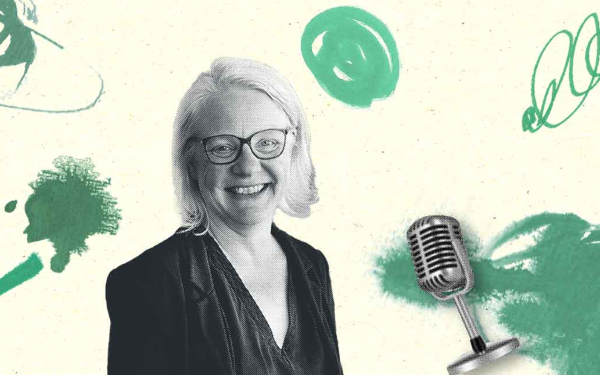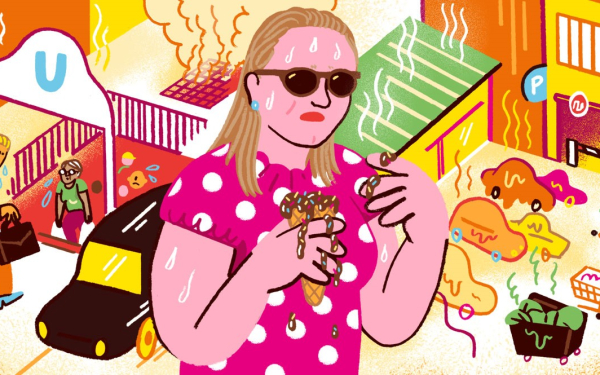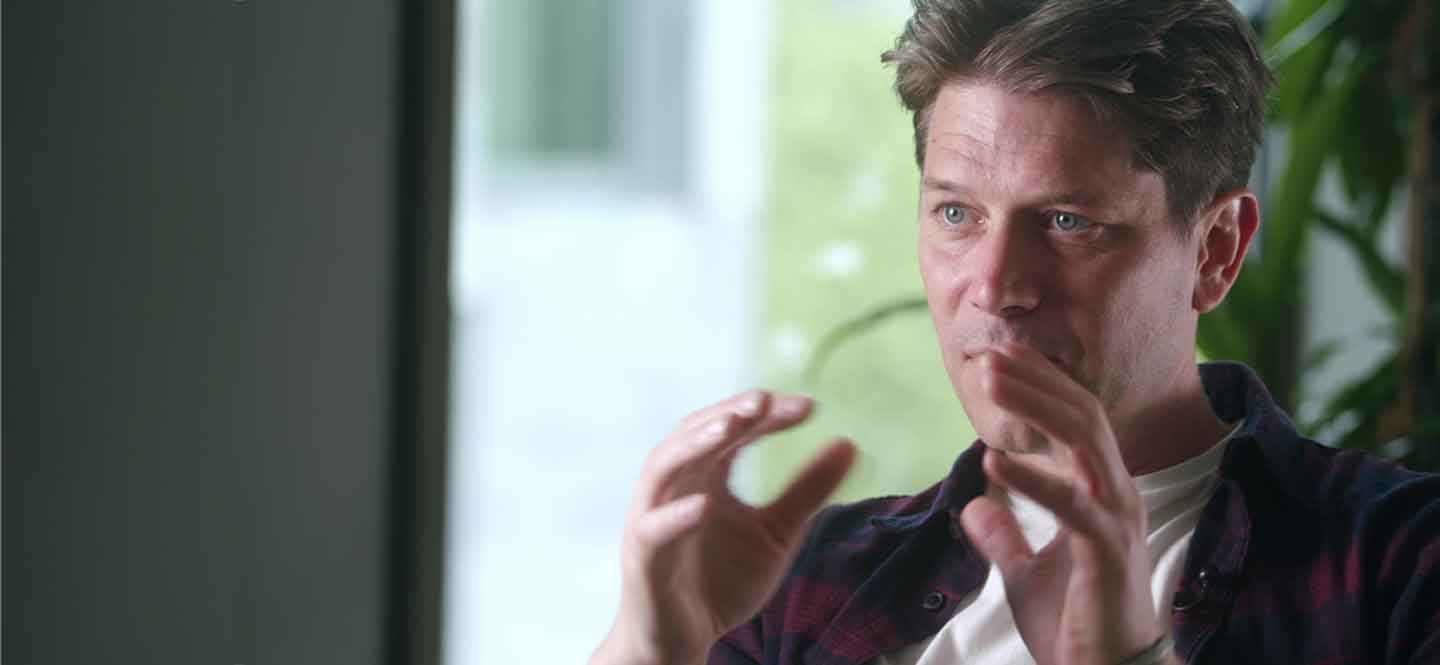
Blitzfang für VolkswagenStiftung
Preventing future pandemics through community empowerment
Human societies transform the natural environment around them. If this impact is negative, it can increase infectious disease risk. Epidemiologist Joacim Rocklöv believes changing human behavior is critical to preventing pandemics from happening in the future.
"How we affect natural environments will have consequences for us," explains Joacim Rocklöv, who took up a position as Alexander von Humboldt Professor at Heidelberg University in 2022, based between the Institute of Global Health and the Interdisciplinary Centre for Scientific Computing. "I'm really interested in how our interaction with the environment affects us. I'm also really invested in trying to bring knowledge to people to change unsustainable behaviors," he says. "In my opinion, the only way we can change that is through knowledge and action."
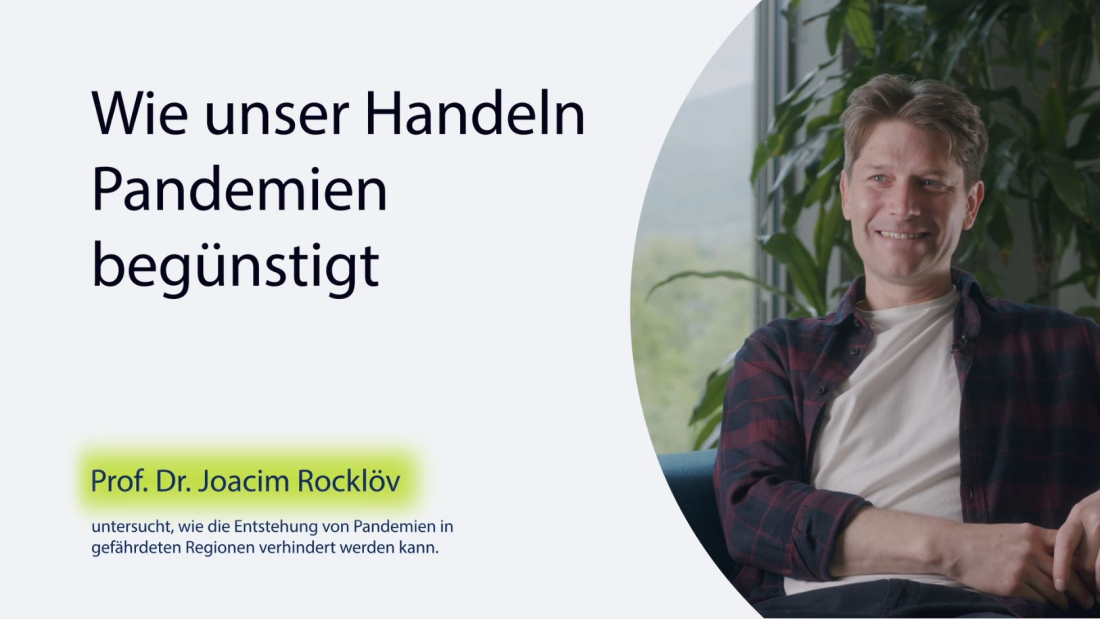
ehrenwerk.tv für VolkswagenStiftung
Joacim Rocklöv in our video portrait: How our actions favour pandemics
Rocklöv didn’t come from an academic family, but says he always found mathematical and natural science fascinating. Starting out as a mathematician, he became interested in health-related research while studying for his master’s degree in mathematical statistics at Umeå University in Sweden, where he remains a visiting professor affiliated with the Department of Public Health and Clinical Medicine.
Tackling the root of the problem
"I feel strongly about the environment, but I was not always so aware. That changed when I was looking for a thesis project for my master’s degree," Rocklöv says. "I was looking for something in the interface between mathematics and health and when I found it, I got hooked."
After staying on at Umeå University and completing a PhD in environmental epidemiology, Rocklöv has continued his interdisciplinary research focusing on global health, environmental change, and infectious disease epidemiology. He is particularly interested in preventing pandemics and how man-made problems like climate change can impact the spread of disease.
By improving animal health [...] and by improving the environment, we can improve human health [...]
"I am concerned about how we affect the health of the environment, animals, and humans; collectively known as planetary health. This impacts the risk of zoonotic disease and pandemics in many different ways," he says, explaining that he believes there is too strong a global focus on pandemic preparedness rather than prevention.
"As I see it, we need to tackle the root of the problem otherwise it risks growing out of control. This involves deep prevention such as tackling climate change, deforestation, and the animal trade. Of course, vaccines are greatly needed too and diagnostics so we can detect and act, but we cannot only respond, we have to act proactively."
A climate in flux
Many infections, particularly those borne by insects or animals, have the potential to be influenced by climate change, a topic that is close to Rocklöv’s heart. For example, mosquitoes that carry diseases such as dengue fever and malaria are adapted to live in warm climates. As traditionally cooler countries or regions, such as Europe, warm up, these insects are able to survive and spread disease in a wider area than before.
"The suspicion is, and I think rightly, that we've put a lot of effort into understanding diseases like dengue and malaria, but there's much more out there. Climate affects ecosystems, the longevity of insects and animals, food webs, and everything in the natural systems," emphasizes Rocklöv.
Scientists predict that a minimum of 10,000 viral species circulating in wild animal populations could infect humans. At present most do not, but this could all change in the future. A paper published in the journal Nature in 2022 predicts that changes in climate and land use could lead to around 4000 cases of cross-species transmission of such viruses by 2070, based on current statistics.
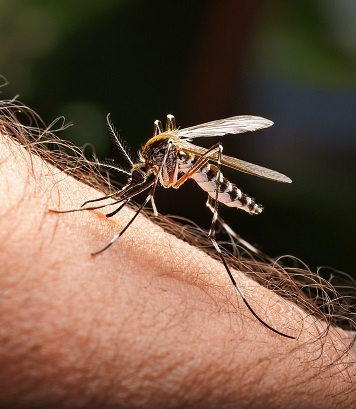
The Asian tiger mosquito transmits pathogens such as the Zika or dengue virus. It has been introduced worldwide in recent decades through the transport of goods and travelling.
Rocklöv is keen to do everything he can to prevent this happening and he and his colleagues have been instrumental in working with policy makers and health authorities to encourage the setting up of early warning systems and developing tools to enable communities to adapt to climate change and avoid disease outbreaks in alliance with the One Health–Climate Risk framework.
An early adopter
The rapid spread of the SARS-CoV-2 virus and the subsequent global Covid-19 pandemic between the end of 2019 and spring 2023 took most of us by surprise. Since it began, pandemic preparedness and prevention of disease transmission from animals to humans has been on the minds of many.
However, experts in the field, including Rocklöv, suspected a pandemic may be on the horizon. Scares from H5N1 flu outbreaks in the early 2000’s led to the One Health Initiative Task force being set up in 2006 to try and prevent large epidemics by observing and changing links between humans, animals and the environment.
"It’s the combination of considering the health of environment, the health of animals and the health of humans as not three separate things, but as one thing that fits together and affects each other," explains Rocklöv, who was an early proponent of the idea. "By improving animal health, we could improve human health and by improving the environment, we can improve human health as well."
Rocklöv was already working in this area after he finished his PhD in 2010 and received the Young Researcher Award from Umeå University in 2012. Seven years later he also received the Prince Albert II of Monaco - Pasteur Institute Prize for his research on climate-related arbovirus epidemics, which include diseases such as dengue fever, chikungunya virus, Zika virus and other viruses spread by mosquitos and ticks.
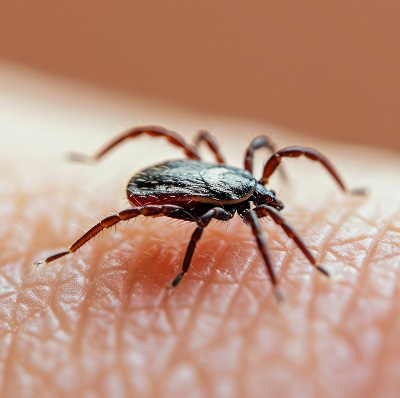
Ticks can infect humans and animals with a number of serious diseases. In Europe, they primarily transmit the pathogens of TBE (tick-borne encephalitis) and Lyme disease to humans.
Pandemic silver lining
During the pandemic, Rocklöv tried to use his knowledge of infectious diseases and epidemiology to help local authorities along with other experts. He did some risk assessment modelling and helped predict infection fatality rates with colleagues working in the area, but says he was disappointed by how slow the Swedish authorities were at responding to signs the pandemic was spreading. "I was convinced the signs from China had to be taken more seriously," he says, "but it was not easy because those situations became so political and polarized."
On the positive side, Rocklöv says the silver lining is that there has been increased interest in his work since the onset of the pandemic. "I think the One Health area is going through a revolution in how it's considered and taken up. Different research communities are starting to talk to one another and come together, which is nice to see," he says. "I think it's really important to break silos. I'm very interdisciplinary in my research, so for me it's not very important what you call an area, but more how it contributes to tackling these problems and issues."
PANDA: Inspiring local communities
This year, Rocklöv will co-lead a new project with Till Bärnighausen, also a professor at Heidelberg University and director of the Heidelberg Institute of Global Health, which is funded by the Volkswagen Foundation. The project is part of the Foundation’s Global Issues initiative and was funded by the recent ‘Preventing Pandemics: The Role of Human-Environmental Interactions’ call. The 4-year project involves partners in Norway, Laos and Thailand and is entitled: 'Preventing pandemic risk by improving pandemic literacy among communities at the frontline of disease emergence in Southeast Asia (PANDA)'.
"I think we benefited from the intersection of the old and the new environment after I moved to Germany, as well as the new interest in research on pandemic pathogens in the wake of the pandemic," says Rocklöv, who explains that "the very integrated action informing research we are doing, going from data collection across social, animal and environmental domains, involving people in participatory research, and going from lab analyses of viruses to models and evaluation of interventions is not common."
The PANDA project will research behaviors that may encourage transmission of a range of infectious diseases from animals to humans in local communities in Southeast Asia and then work with local people to stop these risky practices at source. It plans to be truly transdisciplinary in nature and will involve local community members, health services and political stakeholders in its execution. For example, the researchers will co-design interventions that could reduce spillover risk with the local communities they will be working with, as well as involving them in the initial research. The research team will also work with local policy makers to try and implement any interventions that may result from the project.
I think it's really important to break silos.
"The rate of change in how we affect the environment is really fast. If we just observe as scientists, we continue debating the things we don't know instead of actually doing the things we know will help. That's really important, but it's also really vital to try to make use of the knowledge we have in the best possible way," says Rocklöv.
Focusing on at-risk areas
The project is taking place in Laos and Thailand because these countries are hotspots for emerging infectious diseases. They have large human populations, significant intrusion by humans into natural environments and high biodiversity. The China-Thailand high-speed railway, which will also connect Laos to these countries, is currently being completed. When finished it will increase trade and travel in the region, which Rocklöv and colleagues believe will also impact infectious disease risk and spread.
"Another example is the high number of illegal or unofficial dump sites within communities in this area. They are the perfect sort of melting pot of certain types of animals. Human-animal interactions at so-called ‘wet’ markets are also important."
"With our project we want to prevent disease spillover in everyday life conditions, partly by addressing behavior change, partly by realizing the more upstream ecological drivers in environmental exploitation and animal husbandry and trade", Rocklöv explains.

